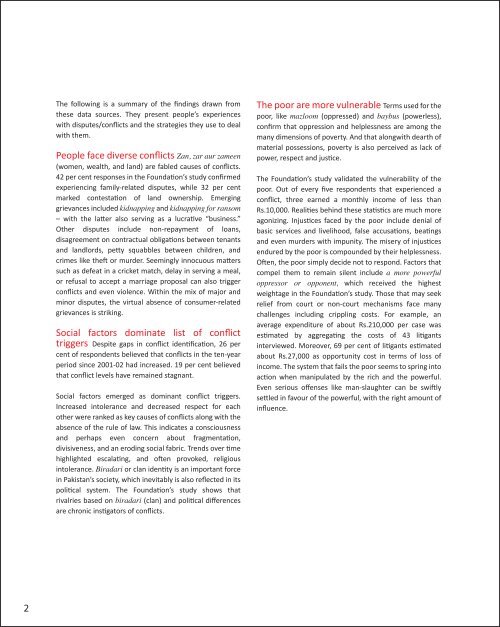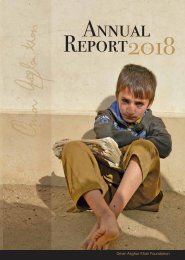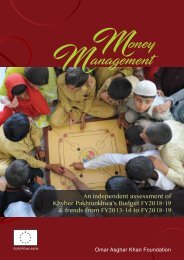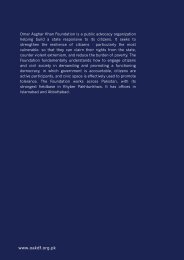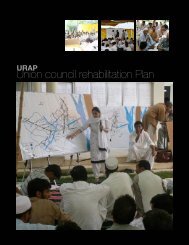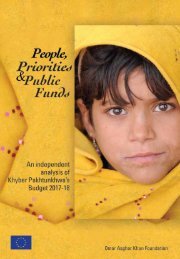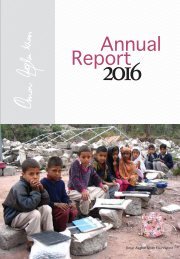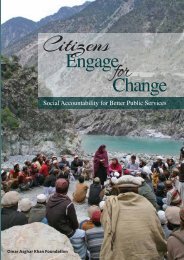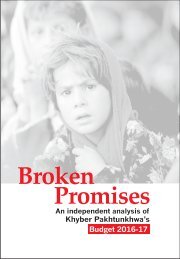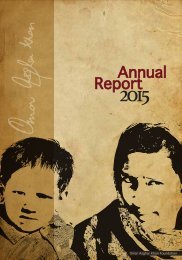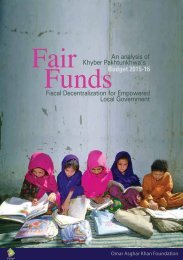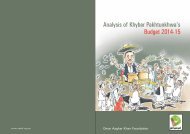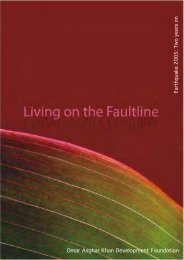Justice Denied
You also want an ePaper? Increase the reach of your titles
YUMPU automatically turns print PDFs into web optimized ePapers that Google loves.
The following is a summary of the findings drawn from<br />
these data sources. They present people’s experiences<br />
with disputes/conflicts and the strategies they use to deal<br />
with them.<br />
People face diverse conflicts Zan, zar aur zameen<br />
(women, wealth, and land) are fabled causes of conflicts.<br />
42 per cent responses in the Foundation’s study confirmed<br />
experiencing family-related disputes, while 32 per cent<br />
marked contestation of land ownership. Emerging<br />
grievances included kidnapping and kidnapping for ransom<br />
– with the latter also serving as a lucrative “business.”<br />
Other disputes include non-repayment of loans,<br />
disagreement on contractual obligations between tenants<br />
and landlords, petty squabbles between children, and<br />
crimes like theft or murder. Seemingly innocuous matters<br />
such as defeat in a cricket match, delay in serving a meal,<br />
or refusal to accept a marriage proposal can also trigger<br />
conflicts and even violence. Within the mix of major and<br />
minor disputes, the virtual absence of consumer-related<br />
grievances is striking.<br />
Social factors dominate list of conflict<br />
triggers Despite gaps in conflict identification, 26 per<br />
cent of respondents believed that conflicts in the ten-year<br />
period since 2001-02 had increased. 19 per cent believed<br />
that conflict levels have remained stagnant.<br />
Social factors emerged as dominant conflict triggers.<br />
Increased intolerance and decreased respect for each<br />
other were ranked as key causes of conflicts along with the<br />
absence of the rule of law. This indicates a consciousness<br />
and perhaps even concern about fragmentation,<br />
divisiveness, and an eroding social fabric. Trends over time<br />
highlighted escalating, and often provoked, religious<br />
intolerance. Biradari or clan identity is an important force<br />
in Pakistan’s society, which inevitably is also reflected in its<br />
political system. The Foundation’s study shows that<br />
rivalries based on biradari (clan) and political differences<br />
are chronic instigators of conflicts.<br />
The poor are more vulnerable Terms used for the<br />
poor, like mazloom (oppressed) and baybus (powerless),<br />
confirm that oppression and helplessness are among the<br />
many dimensions of poverty. And that alongwith dearth of<br />
material possessions, poverty is also perceived as lack of<br />
power, respect and justice.<br />
The Foundation’s study validated the vulnerability of the<br />
poor. Out of every five respondents that experienced a<br />
conflict, three earned a monthly income of less than<br />
Rs.10,000. Realities behind these statistics are much more<br />
agonizing. Injustices faced by the poor include denial of<br />
basic services and livelihood, false accusations, beatings<br />
and even murders with impunity. The misery of injustices<br />
endured by the poor is compounded by their helplessness.<br />
Often, the poor simply decide not to respond. Factors that<br />
compel them to remain silent include a more powerful<br />
oppressor or opponent, which received the highest<br />
weightage in the Foundation’s study. Those that may seek<br />
relief from court or non-court mechanisms face many<br />
challenges including crippling costs. For example, an<br />
average expenditure of about Rs.210,000 per case was<br />
estimated by aggregating the costs of 43 litigants<br />
interviewed. Moreover, 69 per cent of litigants estimated<br />
about Rs.27,000 as opportunity cost in terms of loss of<br />
income. The system that fails the poor seems to spring into<br />
action when manipulated by the rich and the powerful.<br />
Even serious offenses like man-slaughter can be swiftly<br />
settled in favour of the powerful, with the right amount of<br />
influence.<br />
2


